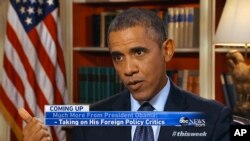U.S. President Barack Obama says he and new Iranian President Hassan Rouhani have exchanged letters about the situation in Syria, and that diplomacy backed by military threat is a model for negotiating with Tehran over its nuclear ambitions.
In a U.S. television interview broadcast Sunday, Obama said Iran should avoid thinking the United States would not launch a military strike in response to Tehran's nuclear program just because it has not attacked Syria.
He said Iranian leaders understand the U.S. concern about a potential nuclear-armed Iran "is a far larger issue" for the United States than Syria's chemical weapons.
Obama told ABC News "the threat against ... Israel that a nuclear Iran poses is much closer to our core interests," adding that "a nuclear arms race in the region" would be "profoundly destabilizing."
Iran says its nuclear program is for peaceful purposes.
U.S. Secretary of State John Kerry, speaking Sunday in Jerusalem, said the recent U.S.-Russian agreement on Syria's chemical weapons also serves as a "marker" for the international community as it deals with Iran's suspected nuclear weapons program.
"The threat of force is real and the Assad regime and all those taking part need to understand that President Obama and the United States are committed to achieve this goal. We cannot have hollow words in the conduct of international affairs because that affects all other issues, whether Iran or North Korea or any other," said Kerry.
Kerry briefed Israeli Prime Minister Benjamin Netanyahu on what the U.S. secretary of state called "the most far-reaching chemical weapons removal ever," after the Israeli leader said the agreement would be judged on whether it achieved the arsenal's "complete destruction."
Standing with Kerry, Netanyahu cautiously welcomed the deal and stressed his belief that it could have deep repercussions on Iran. He said the determination the international community shows regarding Syria "will have a direct impact on the Syrian regime's patron, Iran."
Tehran's nuclear program has been one of Israel's chief concerns for years.
But Israeli leaders are also worried that Syrian President Bashar al-Assad may fire his chemical weapons at the Jewish state in an act of desperation or that the weapons could fall into the hands of the Lebanese militant group, Hezbollah, or other hostile parties fighting in Syria's civil war.
In a U.S. television interview broadcast Sunday, Obama said Iran should avoid thinking the United States would not launch a military strike in response to Tehran's nuclear program just because it has not attacked Syria.
He said Iranian leaders understand the U.S. concern about a potential nuclear-armed Iran "is a far larger issue" for the United States than Syria's chemical weapons.
Obama told ABC News "the threat against ... Israel that a nuclear Iran poses is much closer to our core interests," adding that "a nuclear arms race in the region" would be "profoundly destabilizing."
Iran says its nuclear program is for peaceful purposes.
U.S. Secretary of State John Kerry, speaking Sunday in Jerusalem, said the recent U.S.-Russian agreement on Syria's chemical weapons also serves as a "marker" for the international community as it deals with Iran's suspected nuclear weapons program.
"The threat of force is real and the Assad regime and all those taking part need to understand that President Obama and the United States are committed to achieve this goal. We cannot have hollow words in the conduct of international affairs because that affects all other issues, whether Iran or North Korea or any other," said Kerry.
Kerry briefed Israeli Prime Minister Benjamin Netanyahu on what the U.S. secretary of state called "the most far-reaching chemical weapons removal ever," after the Israeli leader said the agreement would be judged on whether it achieved the arsenal's "complete destruction."
Standing with Kerry, Netanyahu cautiously welcomed the deal and stressed his belief that it could have deep repercussions on Iran. He said the determination the international community shows regarding Syria "will have a direct impact on the Syrian regime's patron, Iran."
Tehran's nuclear program has been one of Israel's chief concerns for years.
But Israeli leaders are also worried that Syrian President Bashar al-Assad may fire his chemical weapons at the Jewish state in an act of desperation or that the weapons could fall into the hands of the Lebanese militant group, Hezbollah, or other hostile parties fighting in Syria's civil war.





